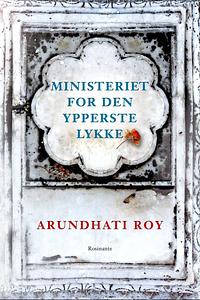Take a photo of a barcode or cover
Not sure how I feel about this book
Roy's style is as lyrical as ever. There was way too much packed in this book. Of course I loved the Kashmir part of the book the most. So close to my heart and she "gets" the ground reality. I will have to re-read this one day to absorb all the nuances.
Roy's style is as lyrical as ever. There was way too much packed in this book. Of course I loved the Kashmir part of the book the most. So close to my heart and she "gets" the ground reality. I will have to re-read this one day to absorb all the nuances.
Nelisen kuukautta tämän kanssa taisteltua ja väännettyä sain sen viimein vajaassa viikossa loppuun luettua. Runsas, rönsyilevä, kaikeksi todellakin muuttuva tarina, jossa yhtaikaa ei tuntunut olevan mitään mistä tarttua ja samalla siinä oli kuitenkin koko maailma.
Täydellisen ymmärtämisen saavuttamiseksi pitäisi todennäköisesti lukea vielä toisen kerran (jos sekään nyt tämän kanssa riittäisi), mutta tällä ensimmäisellä kerralla sanoisin kokonaisarvosanaksi 3,5-4 tähteä.
Täydellisen ymmärtämisen saavuttamiseksi pitäisi todennäköisesti lukea vielä toisen kerran (jos sekään nyt tämän kanssa riittäisi), mutta tällä ensimmäisellä kerralla sanoisin kokonaisarvosanaksi 3,5-4 tähteä.
This sprawling novel takes place over the span of about fifty years in India. It doesn't have a "plot" really, and so when asked to describe it I find myself thinking of it as a novel about India rather than just a novel set in India. A large cast of characters who weave in and out of each other's stories allows the author to explore different aspects of the political and cultural climate.
This book reminded me a lot of Victor Hugo's Les Miserables. My favorite parts of it were the digressions about life in India, about politics, about history, about culture and people. Roy has a way with words and short passages caught me off guard as being funny, tragic, poignant, or extremely wise. The characters, on the other hand, were much less compelling and the fact that we were constantly being jerked back and forth between different periods in history left me disoriented and uninterested in the character's arcs as a whole.
This book reminded me a lot of Victor Hugo's Les Miserables. My favorite parts of it were the digressions about life in India, about politics, about history, about culture and people. Roy has a way with words and short passages caught me off guard as being funny, tragic, poignant, or extremely wise. The characters, on the other hand, were much less compelling and the fact that we were constantly being jerked back and forth between different periods in history left me disoriented and uninterested in the character's arcs as a whole.
It’s a meandering story through a dozen characters and a big chunk of northern Indian geopolitics. It’s rich in descriptions and painting the scenes— took about 200 pages to detect a direction for the plot, so if you can stick with it, it’s in there. And then, all of a sudden, you’re sad it’s over.
didn’t quite come together, but i think thats the point. a little uneven and disjointed but incredibly ambitious, like roy’s vision of a coalitional political resistance and all the people she crammed into one graveyard. but there are moments that are so amazing—i love how roy turns our attention to the beauty and love in political struggle. this one goes out to all the people who thought the god of small things was just a “magical realist” novel.
This story is about a lot of things but mostly it's about what happens when people are squeezed into spaces that are not large enough to contain human multitudes.
"The irony was -- is -- that if you put four Kashmiris in a room and ask them to specify what exactly they mean by Azadi, what exactly are its ideological and geographic contours, they would probably end up slicing each other's throats. And yet it would be a mistake to chalk this down to confusion. Their problem is not confusion, not really. It's more like a terrible clarity that exists outside the language of modern geopolitics. All the protagonists on all sides of the conflict, especially us, exploited this fault line mercilessly. It made for a perfect war -- a war that can never be won or lost, a war without end."
"By the time they got back, the lights were all out and everybody was asleep. Everybody, that is, except for Guih Kyom the dung beetle. He was wide awake and on duty, lying on his back with his legs in the air to save the world in case the heavens fell. But even he knew things would turn out all right in the end. They would, because they had to."
"The irony was -- is -- that if you put four Kashmiris in a room and ask them to specify what exactly they mean by Azadi, what exactly are its ideological and geographic contours, they would probably end up slicing each other's throats. And yet it would be a mistake to chalk this down to confusion. Their problem is not confusion, not really. It's more like a terrible clarity that exists outside the language of modern geopolitics. All the protagonists on all sides of the conflict, especially us, exploited this fault line mercilessly. It made for a perfect war -- a war that can never be won or lost, a war without end."
"By the time they got back, the lights were all out and everybody was asleep. Everybody, that is, except for Guih Kyom the dung beetle. He was wide awake and on duty, lying on his back with his legs in the air to save the world in case the heavens fell. But even he knew things would turn out all right in the end. They would, because they had to."
I'd forgotten how well Arundhati Roy writes. This is an exhausting and brilliant novel bringing in a lot of Roy's political interests and concerns particularly around the politics and atrocities happening in Kashmir. As an outsider it's difficult to keep up - most particularly in the latter part of the novel which at times feel like a riff on Kurt Vonnegut. Nor is there an obvious point of view in the novel or is it always clear about individual motivations. And yet for all that it does paint a very solid picture of contemporary Delhi, of North India and an interlaced group of people and I was swept away by the labyrinthine storytelling even when I kinda knew there wasn't going to be a clear linear narrative emerging.
I wanted to like it more. And I did like parts of it A LOT MORE. But parts of it just felt like extraneous stuff thrown in there - I had a hard time not calling it quits.
I read some of the reviews of THE MINISTRY OF UTMOST HAPPINESS before I plunged into it. I should specify that these were "reader reviews" as opposed to "critic reviews". It's one of those weird books that seems to divide critics and readers: the general audience did not seem thrilled with it ("too scattered", "no plot"), while critics seemed to adore it ("elegaic", beautifully written"). Given that I often side with the stuffy critics (also see Groff's FATES AND FURIES) in matters like these, I decided to give it a try.
I can see what Roy is doing here. I can appreciate it. However, it never lands in a way that it ultimately satisfying. I enjoyed the bell-curve structure of the novel, starting small, ballooning into an epic, and then gradually reducing itself to another small-scale story to end things. I liked that we start and end with the same characters. Hell, if it was just the first 100 and last 100 pages, I would probably really enjoy THE MINISTRY OF UTMOST HAPPINESS. However, that's not the case. The novel feels like it gets away from Roy in this middle section, and while I can trust that this sprawling feeling was her intent, it just doesn't work for me.
The language? Oh, the language is often excellent. Roy writes in a way that is vivid and magical. Where many of her contemporaries are cerebral, writing with all the self-consciousness that a mustachio'ed hipster in a Starbucks, Roy is soulful. The novel isn't an outright story of magical realism, but its prose reflects that it is. It's a good fit.
I can see what Roy is doing here. I can appreciate it. However, it never lands in a way that it ultimately satisfying. I enjoyed the bell-curve structure of the novel, starting small, ballooning into an epic, and then gradually reducing itself to another small-scale story to end things. I liked that we start and end with the same characters. Hell, if it was just the first 100 and last 100 pages, I would probably really enjoy THE MINISTRY OF UTMOST HAPPINESS. However, that's not the case. The novel feels like it gets away from Roy in this middle section, and while I can trust that this sprawling feeling was her intent, it just doesn't work for me.
The language? Oh, the language is often excellent. Roy writes in a way that is vivid and magical. Where many of her contemporaries are cerebral, writing with all the self-consciousness that a mustachio'ed hipster in a Starbucks, Roy is soulful. The novel isn't an outright story of magical realism, but its prose reflects that it is. It's a good fit.
If you are going to find traces of TGOST here, you will be disappointed (Metoo).
As a book with multiple leads, it was difficult to connect with the story easily.
Even the ways of meeting and building of relationship between the main characters will not be that convincing to normal audience.
But, but, but.. This book should be read for its beautiful and poetic writing. As always, Arundhati is best in this ❤️.
The writing is what matters the most in these kind of books. Not even once you get distracted, even after too many forgotable characters, events and back connections. That's her speciality and she has nailed it.
Loved this book though it lacks a full fledged plot.
(Plots can be found in all books, but not this kinda soulful writing😍) Give it a try and you will definitely love it and may be will start loving urdu too..!
As a book with multiple leads, it was difficult to connect with the story easily.
Even the ways of meeting and building of relationship between the main characters will not be that convincing to normal audience.
But, but, but.. This book should be read for its beautiful and poetic writing. As always, Arundhati is best in this ❤️.
The writing is what matters the most in these kind of books. Not even once you get distracted, even after too many forgotable characters, events and back connections. That's her speciality and she has nailed it.
Loved this book though it lacks a full fledged plot.
(Plots can be found in all books, but not this kinda soulful writing😍) Give it a try and you will definitely love it and may be will start loving urdu too..!








